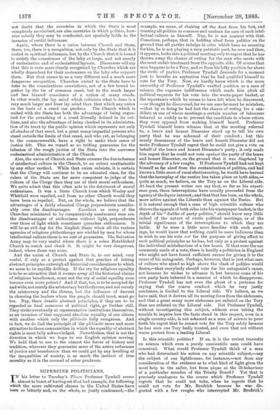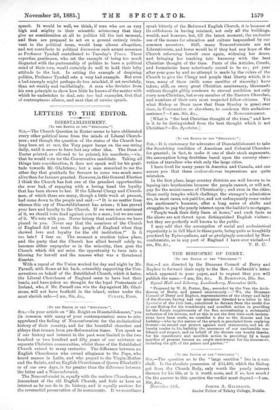SUPERFINE POLITICIANS.
IN his letter to Tuesday's Times Professor Tyndall seems almost to boast of having set that bad example, for following which the more cultivated classes in the United States have been so bitterly and, on the whole, so justly condemned,—the
example, we mean, of shaking off the dust from his feet, and treating all politics as common and unclean for men of such intel- lectual culture as himself. Nay, he is not content with that.
Conscious, perhaps, that in holding aloof from politics on the ground that all parties indulge in cries which have no meaning Conscious, perhaps, that in holding aloof from politics on the ground that all parties indulge in cries which have no meaning
for him, he is not playing a very patriotic part, he now and then, it appears, looks into a political meeting only to regret that he has thrown away the chance of voting for the man who meets with the most unfair treatment from the opposite side. Of course that man happens to be a Tory, and so from his lofty position far above the strife of parties, Professor Tyndall descends for a moment just to breathe an aspiration that he had qualified himself to vote for the Tory. Now, we hardly know which is the more unworthy of Professor Tyndall's exalted position as a man of science, the supreme indifference which made him pitch all political requests for his vote into the waste-paper basket, or the repentance which he seems to have felt when he discovered, —or thought he discovered, for we are sure he must be mistaken, —that by so doing he had lost the chance of voting for a can- didate at one of whose meetings a certain number of labourers behaved so rudely as to prevent the candidate to whose return they were opposed from making himself heard. Professor Tyndall himself bears witness that at the meeting referred to, a brave and honest Dissenter stood up to tell his own party that he was ashamed of their conduct ; but this manly demeanour of the brave and honest Dissenter did not make Professor Tyndall regret that he could not give a vote on behalf of the brave and honest Dissenter's party; it only made him regret that he could not vote against the party of the brave and honest Dissenter, on the ground that it was disgraced by the advocacy of a few roughs. If Professor Tyndall had not kept himself so fax aloof from the contamination of politics, and had known a little more of rural electioneering, he would have learned that the horseplay of the rustics has taken place on both aides,— quite as much, we believe, on the Tory as on the Liberal side. At least the present writer can say that, so far as his experi- ence goes, these interruptions have usually proceeded from the agency of the liquor interest ; and that that has been, on the whole, more active against the Liberals than against the Tories. But it is natural enough that a man of high scientific culture who throws the appeals of both sides into his wastepaper-basket, in the depth of his " dislike of party politics," should know very little indeed of the nature of rustic political meetings, or of the trivial significance of the interruptions to which they are liable. If he were a little more familiar with such meet- ings, he would know that nothing could be more ludicrous than to wish to use his vote not for the purpose of giving effect to such political principles as he has, but only as a protest against the individual misbehaviour of a few boors. If that were the use commonly made of a vote, there is hardly a politician in England who might not have found sufficient excuse for giving it to the cause of his antagonist. Perhaps, however, that is just what men of culture who stand so high above the clash of politics would desire,—that everybody should vote for his antagonist's cause, not because he wishes to advance it, but because some of his own party have behaved in a manner of which he disapproves. Professor Tyndall has not even the ghost of a pretence for saying that the coarse conduct which he very justly condemns, is limited to the Liberal side. We believe, as we have said, that it derives all its moving force from the alehouses, and that a great many more alehouses are enlisted on the Tory than are enlisted on the Liberal side. But Professor Tyndall, without investigating this subject, without even taking the trouble to inquire how the facts stand in this respect, even in a single country-side, is not ashamed as a man of science to pour forth his regret that he cannot vote for the Tory solely because he has seen one Tory badly treated, and even that not without warm protest from a leading Liberal.
Is this scientific politics ? If so, it is the veriest travestie on science which even a purely unscientific man could have conceived. What would Professor Tyndall think of a man who had determined his action on any scientific subject, —say the subject of our lighthouses, for instance,—not from any consideration of the evidence as to what kind of light gives the most help to the sailor, but from pique at the ill-behaviour of a particular member of the Trinity Board P Yet that is precisely analogous to the course which Professor Tyndall regrets that he could 'not take, when he regrets that he could not vote for Mr. Brodrick because he was dis- gusted with a few roughs who interrupted Mr. Brodrick's speech. It would be well, we think, if men who are so very high and mighty in tbeir scientific aristocracy that they give no consideration at all to politics till the last moment, and then are prepared to act on a ground entirely irrele- vant to the political issue, would keep silence altogether, and not contribute to political discussion such arrant nonsense as Professor Tyndall contributed to Tuesday's Times. These superfine gentlemen, who set the example of being too much disgusted with the partisanship of politics to have a political mind of their own, would certainly do well to hold their lofty attitude to the last. In setting the example of despising politics, Professor Tyndall sets a very bad example. But even a bad example might perhaps do less mischief, if set resolutely, than set weakly and vacillatingly. A man who deviates from his own principle to show how little he knows of the matter with which he undertakes to deal, sets two bad examples, first that of contemptuous silence, and next that of unwise speech.



































 Previous page
Previous page